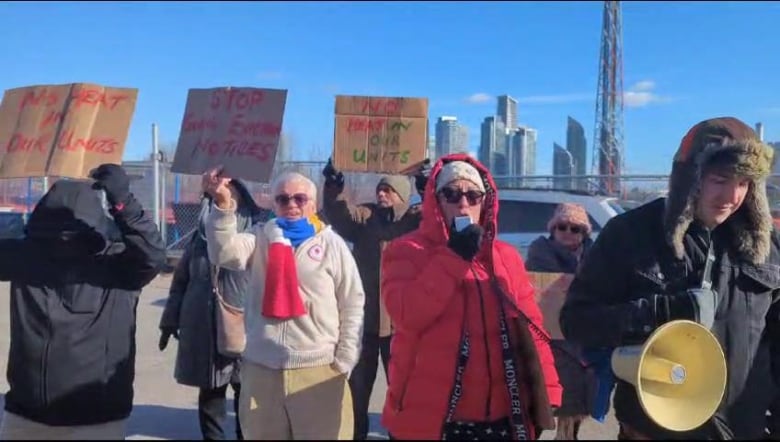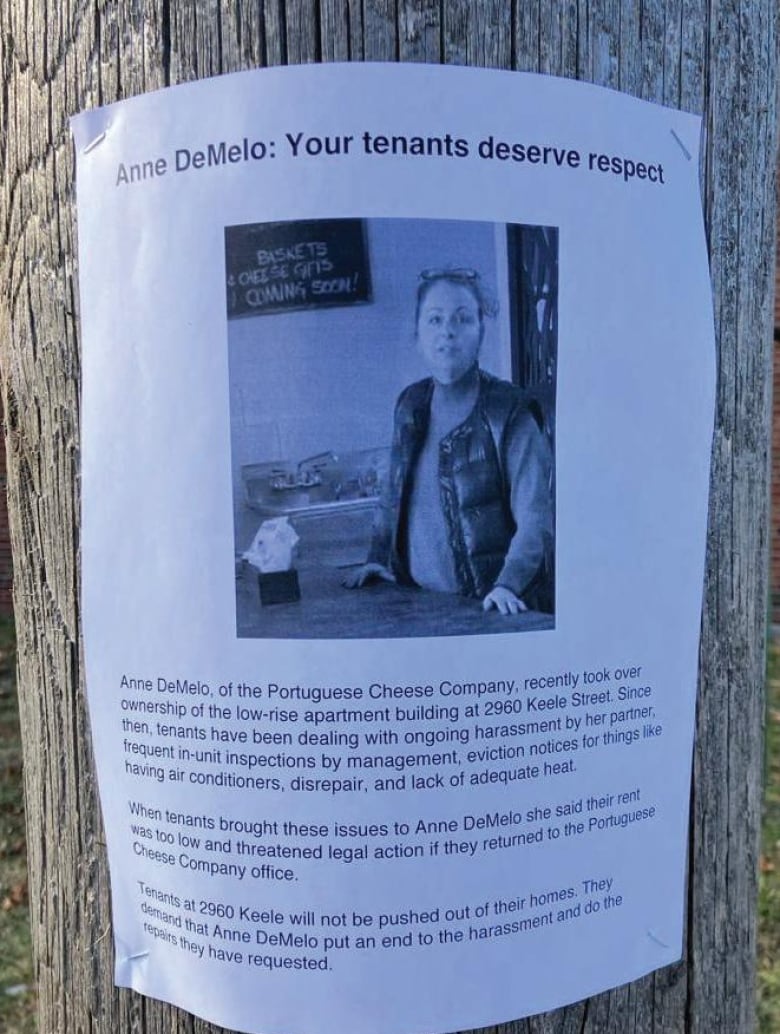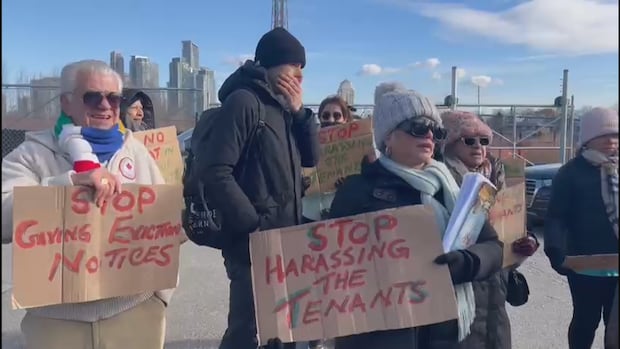
Outside a southwest Toronto cheese business last November, 69-year-old Mohamed Nizam and a dozen of his neighbours stood chanting: “Fix the heat! Fix the heat! No more harassment!”
Nizam told CBC News earlier this month that the group of tenants, who live at a building called the Mello Court Apartments in the city’s north end, were getting desperate about the living conditions there — and their landlord hadn’t been listening to their pleas.
“We tried to call [the landlord] personally and we talked to the property manager, we talked to her spouse. And there’s no heat,” Nizam said, explaining that he and his wife had been sleeping on and under a pile of blankets in their living room to keep warm.
The lack of heat was just one of the tenants’ many complaints.
Records filed in court by the tenants show that last year, the apartment building’s property managers forbade tenants from receiving parcel or food deliveries to their units, sought to evict tenants who refused to take down bird netting protecting their balconies from pigeons and banned Halloween trick-or-treating inside the building. The company also filed eviction notices against 21 tenants who had window-mounted air conditioners, saying the appliances put the building’s old electrical wiring at risk of fire.
That November day, the tenants held up cardboard signs and took turns speaking from a megaphone. After about 30 minutes, they dispersed to place flyers on windshields and signposts.
“Tenants will not be pushed out of their homes,” read the flyers they were posting. “Tenants… demand that [landlord] Anne DeMelo put an end to the harassment and do the repairs they have requested.”
Two months later, they were all served legal papers.

Sued for defamation, harassment, trespass
“We were shocked,” said Nizam, after learning he and some of his fellow tenants were facing litigation following the protest. “We are not going to be silenced.”
Tenants in many Canadian cities can face a litany of hardships in dealing with landlords: renovictions, steep rent increases, maintenance requests that go unheeded. But now some landlords have turned to a new tactic — suing their tenants for defamation when disputes hit the boiling point.
In Canada’s three biggest cities, CBC News has found court cases, all in the last three years, in which landlords have filed libel lawsuits against tenants who went public with grievances about their living conditions or how they’ve been treated.
“I have never seen that before,” said Danika So, a Toronto lawyer who is representing the 17 defendant tenants at Mello Court.
“It’s definitely an escalation in the tools that landlords have at their disposal to try and stop tenants from engaging in their expressive rights.”
The statement of claim filed by DeMelo and her Portuguese Cheese Company alleges the flyers the protesting tenants distributed interfered with the company’s affairs, amounted to harassment and were libellous. And it alleges the demonstrations trespassed on company property.
DeMelo and the company are seeking $200,000 in damages from the tenants.
DeMelo did not answer a list of questions sent by CBC News, but in an emailed statement she said that “significant monies have been spent” to improve the building and “numerous efforts have been made” to work with tenants, but some of them “have been steadfast in resorting to divisive tactics.”
She pointed to an email from a municipal standards inspector from last November — about the same time as the demonstration — that said the building is “headed in the right direction.”
The tenants she sued have a court date on Oct. 29. They are trying to get the case thrown out under Ontario’s statute against lawsuits that curtail freedom of expression on matters of public interest.

B.C. landlord shown with devil horns
A number of advocates for tenants’ rights told CBC News that heightened animosity between landlords and tenants is a symptom of Canada’s housing crisis: In provinces with rent control, longtime tenants would have to pay much higher rent if forced to move, so they’re more likely to dig in when landlords try — fairly or unfairly — to push them out. Meanwhile, landlords who have paid top dollar for a property in a frothy real estate market are incentivized to get rid of those long-term tenants paying below-market rates.
“We’re in one of those moments of an upward trend in tenant activism — and of the more militant type,” said Ricardo Tranjan, a senior researcher on housing and social policy with the Canadian Centre for Policy Alternatives. “It’s safe to assume that the retaliation is also going to be there.”

Four months after DeMelo filed her claim, a major landlord in Vancouver, Canada’s priciest rental city, sued some of his tenants for libel.
Anoop Majithia’s company, Plan A Real Estate, took over a low-rise residential building in the city’s West End in the spring. Many existing tenants were on high alert owing to his reputation: Plan A was once fined $10,000 by the provincial housing ministry for violating a law 152 times, was found to have acted in bad faith in trying to evict a tenant and has faced more than one accusation of posting photos in rental ads that don’t match the apartments tenants end up getting.
Within a month of taking over, Plan A moved to evict a four-year tenant, claiming that her partner was living there without authorization, according to court filings. The eviction attempt was dismissed by an adjudicator at B.C.’s Residential Tenancy Branch.
Other residents were told they weren’t lawful tenants or didn’t have a right to the parking they’d been using for years, according to the tenants’ statement of defence. Still others complained that the company wouldn’t respond to emails or concerns they raised.
So in June, tenants got together and protested at Plan A’s offices.
“The landlord continued to basically either ignore or reject any communications that we were making with them,” said Jonathan Petrov, a tenant who participated in the demonstration. “We felt like we had no other recourse except to publicly engage and rally.”
The campaign also involved posters around the neighbourhood calling Majithia “landlord scum” and a slumlord and portraying him with devil horns.

Six weeks later, Plan A and Majithia sued, alleging the posters convey that they are “engaged in illegal activity relating to the eviction of tenants” or “are corrupt, dishonest, without integrity or not to be trusted.”
The lawsuit specifically cites that the defendant tenants — six in all — did interviews with media outlets that covered their protest, including CTV and CityNews.
“The posters are malicious and harmful to the plaintiffs and have caused and will continue to cause damage to the plaintiffs,” the statement of claim said.
Petrov said the libel lawsuit came as a shock to the tenants, who didn’t know what to do at first.
Plan A has since tried to evict Petrov, citing the lawsuit among other things. That was thrown out earlier this month, but Plan A filed a new eviction attempt the next day.
In an emailed statement, Majithia said the tenants he’s suing “assumed an extreme and antagonistic stance even before Plan A began managing the property.” The company had no desire to “have a strained relationship with the tenants,” he said.
Peace bonds, criminal charges
Libel lawsuits aren’t the only tactics landlords have turned to in reaction to tenants who have taken their concerns public.
In one case, a landlord unsuccessfully applied for a peace bond against some Toronto tenants who were protesting outside his house against what they believed to be a renoviction attempt.
In Montreal, when a group of a dozen tenants and tenant advocates tried to deliver a petition by crashing the offices of a major corporate landlord, it led to a minor melee between one of the owners and a protester. The landlords filed criminal charges and sought an injunction to prevent some of the protesters from coming within 100 metres of any of their buildings. They also sued for $540,000, citing defamation and lost income, among other damages.
Tenants from a Toronto apartment protest outside their landlord’s business in 2023, demanding the heat be fixed and that she end repeated eviction notices. The videos were filed in Ontario Superior Court.
In another Toronto case, a landlord locked in a bitter spat with two tenants over living conditions is suing them for $35,000, claiming they libelled her in Facebook posts and YouTube videos. Those posts included a call to boycott a convenience store the landlord owned and to give it bad reviews on Google.
Cole Webber, a community legal worker at Parkdale Community Legal Services in Toronto, who has helped out the tenants at Mello Court and swore an affidavit as part of their lawsuit defence, said as long as the housing crisis continues, these kinds of stories won’t go away.
“Tenants are under immense pressure from landlords in the rental housing market, and so we’re seeing increasing numbers of tenants coming together and organizing to oppose their landlords’ attempts to kick them out of their homes … When tenants organize, they can become a social force that landlords cannot contain.”
